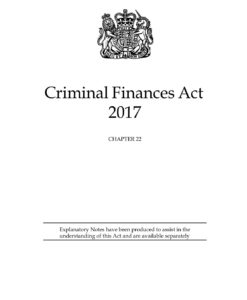Criminal Finances Act 2017 – What You Need to Know
Change Ahead
The main provisions of the Criminal Finances Act 2017 came into force on 30th September 2017, and there are some important effects that any business ought to know.
New Provisions
 While tax evasion is already an offence, currently there is no obligation on a company to take steps to stop another person engaging in such illegal activity. With a few exceptions, if you do not personally participate, you can stand idly by while another person offends. These provisions bring this situation to an end so far as certain aspects of taxation are concerned.
While tax evasion is already an offence, currently there is no obligation on a company to take steps to stop another person engaging in such illegal activity. With a few exceptions, if you do not personally participate, you can stand idly by while another person offends. These provisions bring this situation to an end so far as certain aspects of taxation are concerned.
How?
The Act will render any business (which includes partnerships) liable to prosecution if a ‘tax offence’ is committed by an employee or other person performing services for the company. This will include agents of the business.
To be guilty, the following must apply:
- There has been a criminal evasion of tax (whether that resulted in prosecution or not).
- An ‘Associated Person’ facilitated the commission of that offence (i.e. a person linked to your business).
- A failure by the firm to prevent that facilitation taking place.
The final requirement imposes a strict liability element. Those running the business need not know that anything unlawful was taking place.
The definition of ‘Associated Person’ is broad. It means: ‘…an employee, a person acting in the capacity of an agent, or any other person who performs services for or on behalf of your company who is acting in the capacity of a person performing such services’.
The provisions apply in relation to both UK and foreign offences.
Do you have a Defence?
The good news is ‘Yes’.
But only if you can prove:
(a) That you had in place such prevention procedures as it was reasonable in all the circumstances to expect you to have in place; or
(b) It was not reasonable in all the circumstances to expect you to have any prevention procedures in place.
Therefore, your business needs to have reasonable safeguards in place to be able to try and prevent tax evasion.
What is the Penalty?
Your company could face an unlimited fine.
At the moment, although there aren’t any sentencing guidelines, we can reasonably anticipate these to be very large. In some cases these will be measured in the tens of thousands of pounds and above.
Additionally, you would also need to try and measure the reputational and other damage (such as loss of future contracts) that might follow.
That Doesn’t Sound Good, What Can I Do To Protect My Company?
Your business will need to commit to policies and processes designed to prevent your employees and others committing tax facilitation offences. There is no ‘one size fits all’ policy toolkit that you can purchase off the shelf.
To devise such procedures, you will need to:
- Carry out a risk assessment.
- Decide on what is a proportionate response to that risk.
- Ensure top-level commitment within the organisation to implementing any policy/procedure.
- Maintain due diligence.
- Communicate the policy/procedures and train all employees/agents who carry out work on your behalf.
- Monitor and review the policies and procedures to ensure continued effectiveness.
We Will Certainly Put This On Our ‘To Do’ List
While HMRC doesn’t expect you to have everything in place on 30th September 2017, it does have some ‘day one’ requirements, with HMRC stating in its guidance that:
‘[We expect] there to be rapid implementation, focusing on the major risks and priorities, with a clear timeframe and implementation plan on entry into force.’
Need help?
Laws relating to business can be challenging at the best of times, but when they could also land your company before the courts and facing crippling fines, it is best to act in advance and do all you reasonably can to put protections in place.
The provisions of the Criminal Finances Act 2017 are only summarised above; it will hardly surprise you to know that they are in fact much more complex, so you should take care to understand in detail your actual obligations.
Read more about our business defence services here.
Contact us for advice

Should you wish to discuss any aspects of the Criminal Finances Act 2017 or wish specific advice then please contact partner Martin Hadley at our Nottingham office on 0115 9599550 or email him here.

